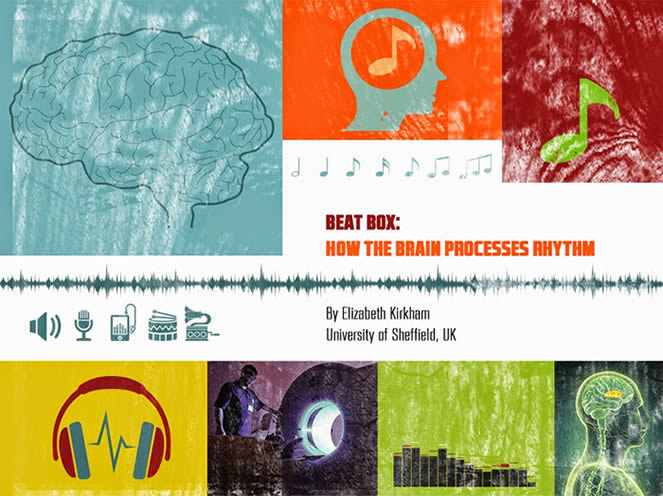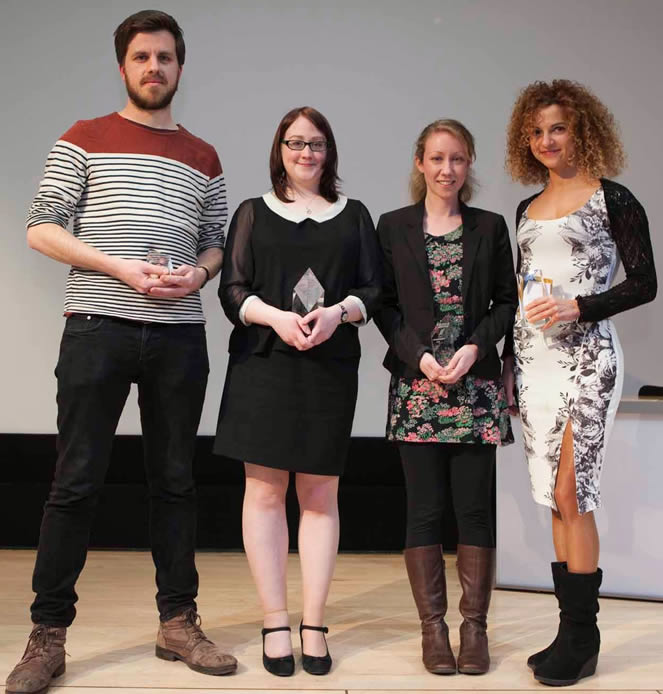Access to Understanding 2014 – science writing prize winner
Access to Understanding is a science writing competition hosted by Europe PubMed Central and The British Library. The 2014 winner was Elizabeth Kirkham, a PhD student at the University of Sheffield and one of the Sheffield ScienceGrrls. Her work focuses upon the impact of depression and early life stress upon cognitive and neurological processing in adulthood.
“How does the brain process rhythm?”, her winning essay, has been published by eLife: http://elifesciences.org/content/3/e02658. In this blog post, she gives her thoughts on the competition.
Science makes its presence known across society; its progress is reflected in medicine, technology, industry, and education. Society also makes its presence known within science. Unfortunately, this means that science is not immune to the various negative stereotypes about women’s skills and abilities. However, whilst these stereotypes can limit women’s progression in scientific fields, we are beginning to see change. Initiatives such as ScienceGrrl illustrate the achievements and abilities of women across scientific disciplines, and women scientists are increasingly making their presence known.
Recently I, along with around 260 other entrants, submitted an entry to Access to Understanding 2014, a science writing competition for PhD and early post doctoral researchers in biomedical and life sciences. Entrants to the competition were asked to write 800 words summarising one of 10 pre-selected articles in a manner that could be understood by a non-specialist. The articles were drawn from across the biomedical sciences, including medicine, neuroscience and molecular biology.
The article I chose to write about concerned the way in which the brain processes rhythm. The research used brain imaging to investigate which brain regions are involved in the ability to maintain a beat in our heads.

Image Source: Serial/Trash
Earlier this year I was told that my article had been shortlisted, and was invited to attend the awards ceremony at The British Library in London. As the ceremony progressed we heard speeches from people involved with the competition, including Sharmila Nebhrajani, Chief Executive of the Association of Medical Research Charities, and Sir Mark Walport, Government Chief Scientific Advisor. The speeches highlighted the importance of ensuring that scientific findings are disseminated beyond the academic community, with jargon-free summaries which explain the purpose of the research to non-specialist audiences. Following the speeches, Sir Mark Walport presented the awards for the overall winners. I was delighted when my article was given first place.
One of the great features of the Access to Understanding 2014 competition is that it provides an opportunity for women scientists to demonstrate their abilities. This year the competition attracted over 260 entries, 66% of which were from women. Crucially, this breakdown was also reflected in the shortlist and in the winners: the shortlist was made up of seven women and three men, and the top three entries were written by two women and one man. This is the second year of the Access to Understanding prize, and in 2013 two of the top three entries were also written by women.

Left to right: Aidan Maartens, Elizabeth Kirkham, Elizabeth McAdam, Lucia Aronica
©The British Library Board
In our society, women are often judged more for their appearance than for their abilities. As a 5’1” Northern woman who is regularly ID’ed when buying alcohol, (despite being closer to 30 than 18), I do not fit society’s stereotype of a scientist. Consequently, one of the many reasons I am grateful to the organisers of Access to Understanding is that winning their award showed me what it was like to be judged purely on merit. Those who congratulated me afterwards did not see my gender, they saw an award-winning scientist. I hope that one day our discipline will become a place where all women are judged on merit, irrespective of whether they are accomplished professors or PhD students like myself.
Elizabeth Kirkham @EK_Neuro.
